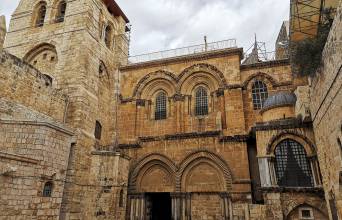Church of the Holy Sepulchre

Church of the Holy Sepulchre A pilgrim places candles in the tomb of the church Floor plan of the church and surrounding areas, 1807 The Church of the Holy Sepulchre (Greek: Ναός του Παναγίου Τάφου, Latin: Ecclesia Sancti Sepulchri, Hebrew: כנסיית הקבר, Arabic: كنيسة القيامة) is a church in the Christian Quarter of the Old City of Jerusalem.
The church contains, according to traditions dating back to at least the fourth century, the two holiest sites in Christianity: the site where Jesus was crucified, at a place known as Calvary or Golgotha, and Jesus's empty tomb, where he was buried and resurrected.
The tomb is enclosed by a 19th-century shrine called the Aedicula. The Status Quo, an understanding between religious communities dating to 1757, applies to the site. Within the church proper are the last four (or, by some definitions, five) stations of the Via Dolorosa, representing the final episodes of the Passion of Jesus.
The church has been a major Christian pilgrimage destination since its creation in the fourth century, as the traditional site of the resurrection of Christ, thus its original Greek name, Church of the Anastasis ('Resurrection'). Today, the wider complex around the Church of the Holy Sepulchre also serves as the headquarters of the Greek Orthodox Patriarch of Jerusalem, while control of the church itself is shared among several Christian denominations and secular entities in complicated arrangements essentially unchanged for over 160 years, and some for much longer.
The main denominations sharing property over parts of the church are the Greek Orthodox, Roman Catholic and Armenian Apostolic, and to a lesser degree the Coptic Orthodox, Syriac Orthodox and Ethiopian Orthodox.
